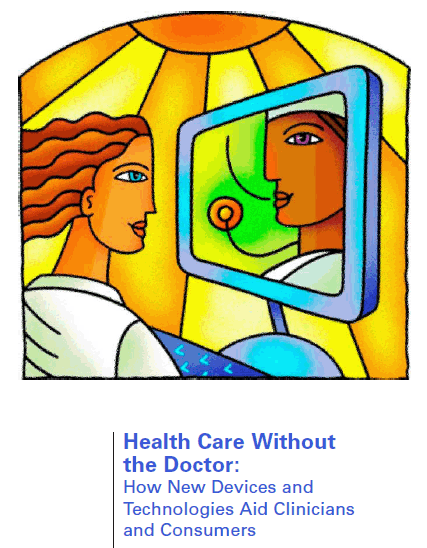Blame it on informed, well-off consumers who pursue wellness and optimum health
Informed consumers may be shifting the healthcare paradigm even as Congress prepares to hammer out its vision of a radically-reformed healthcare system. At least that’s the view of one healthcare expert, who observes that the steady growth in the number of consumer home test kits, patient self-testing devices, and point-of-care tests is a major factor enabling this trend.
People today increasingly get their healthcare outside of the physician-centered healthcare system, stated Mary Kate Scott, Principal at the Los Angeles consulting firm, Scott & Co., in her recent report to the California HealthCare Foundation.
 Mary Kate Scott, author of the report
Mary Kate Scott, author of the report
The report, Health Care Without the Doctor: How New Devices and Technologies Aid Clinicians and Consumers, looked at emerging trends now reshaping healthcare. According to Scott, new technologies, regulation changes, and a desire by health consumers to control their own health have generated remarkable changes in the health care marketplace. This empowers ever more people to manage their own care, both inside and outside the physician’s office. New products and services entering the health marketplace make it possible for people to change how and when get their healthcare.
For example, many consumers now visit an in-store rapid clinic to get their prescriptions from a nurse practitioner. Other consumers order their own lab tests at consumer-oriented laboratories like Any Lab Test Now. Scott noted that it is currently possible, in some retail malls, for a consumer to get tested for a urinary tract infection at a kiosk!
Another change that supports this trend is the availability of more than 700 over-the counter drugs that were formerly available only by prescription, observed Scott. Similarly over the last 15 years, numerous over-the-counter medical devices have become available, enabling a non-physician—even patients themselves—to diagnose, monitor and treat a medical condition.
Of course, pathologists and clinical laboratory managers know how home test kits have proliferated. Scott pointed out that consumers can now buy home test kits at the drugstore for cholesterol, pregnancy, HIV, Hepatitis C, DNA and alcohol. Home tests in the works include sleep apnea, colorectal cancer, Alzheimer’s, influenza, strep throat, along with test kits for health hazards like radon and mold.
Store-bought point-of-care (POC) devices also allow diabetics to monitor their own blood glucose, people taking anticoagulants to assess blood coagulation to avoid problems, and those with kidney failure to self-administer kidney dialysis at home while they sleep.
POC tests also allow lab technicians or nurses to conduct tests formerly in the domain of pathologists. Scott provided the example of Quidel, which pioneered the dipstick pregnancy test and now offers point-of-care test kits for vaginitis, Chlamydia, influenza, and other infectious diseases. Similarly, Claros Diagnostics developed a technology that provides quick, easy, and inexpensive antibody tests for infectious diseases, immune disorders, cancer, and other conditions. The new device, which is the size of a glucose monitor, involves a credit card-size disposable cassette preloaded with reagents that detect multiple disease markers. “In minutes the lab-on-a-chip configuration and rapid-strip tests produce high-performance results in the doctor’s office with a finger-stick of blood,” wrote Scott.
Whether the medical community considers these developments to be good or bad, it is a trend driven by the consumers themselves. Consumers’ willingness to buy and use these products and services motivates companies to develop and introduce these products into the marketplace.
Then there is the convenience factor. Home diagnostic tests and monitoring devices are convenient and inexpensive for consumers, but physicians have resisted recommending them to patients because there’s no financial incentive to do so. In her report, Scott suggested that one reform might be to pay physicians for keeping their patients well, rather than reimbursing them for every office visit.
If this proliferation of consumer-focused point-of-care test kits and devices continues, clinical laboratories and pathology groups may want to respond to this trend by developing information and consultation services oriented to serve consumers who are proactively managing their health. Regardless of the final healthcare reform passed by Congress, it is likely that those consumers with the motivation and the money will continue to pursue wellness, even if it takes them out of the traditional healthcare system. – P. Kirk
Related Information:
Health Care Without the Doctor: How New Devices and Technologies Aid Clinicians and Consumers
Web site of the California HealthCare Foundation
Web site of Mary Kate Scott and Scott Group & Co




